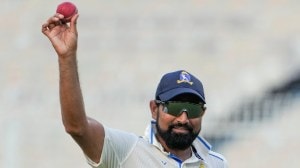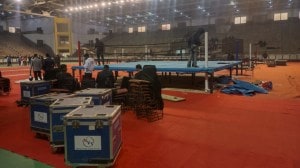DCC bank polls on Feb 13
SOLAPUR, Jan 6: Hectic politicking has gripped political bigwigs in the district, now gearing up for the District Central Co-operative D...

SOLAPUR, Jan 6: Hectic politicking has gripped political bigwigs in the district, now gearing up for the District Central Co-operative DCCbank election. The January 11 deadline for filing the nominations is fast approaching. The elections are scheduled for February 13.
Even as the battle lines are being drawn between groups led by former ministers Vijaysinh Mohite Patil and Laxman Dhoble, a few Mohite-Patil proteges including Minister for State Dilip Sopal and Baban Dada Shinde joining the saffron alliance government has made the scenario confusing for the Mohite-Patils.
Also, Vijaysinh8217;s younger brother Pratapsinh Mohite-Patil getting a ministerial berth after joining the Bharatiya Janata Party is being perceived as a threat to the camp. Considered to be a close associate of Deputy Chief Minister Gopinath Munde, the junior Mohite-Patil had been inducted in the State cabinet before the Lok Sabha elections, last year.
Some politicians, however, believe that the new political equations would hardly affect the Mohite-Patils8217; unbroken dominance over the DCC Bank for about four decades.
Pratapsinh8217;s presence, however, will force the warring Congress factions to unite, political observes felt. It may be recalled that Pratapsinh after having bitten the dust in the Zilla Parishad elections, had announced that his Janseva Yuvak Sanghatna would contest the bank elections. Sensing the threat, many directors who are seeking election may put their might together to ensure victory, it was stated. The Mohite-Patil foes lead by former minister for state Laxaman Dhoble and Jayant Jagtap, son of former MLA Namdevrao Jagtap, from the Congress could prove a major boon for Vijaysinh faction, it is believed. Throwing their hats in the ring are MLA Sudhakar Paricharad and former MLAs Dhanajirao Sathe, Changojirao Deshmukh, Babanrao Chakote, former MLC Brahmadev Mane and Rajan Patil, Babanrao Shinde.
The Bharatiya Janata Party is expected to make a dent in the form of Pratapsinh8217;s candidates, observers said. The DCC Bank, a key factor in development of agro-industries and the co-operative sector has been perceived as a major hub of power, since the bank directors could control the vital strings in the district politics.
- 01
- 02
- 03
- 04
- 05






























